The Intel Optane Memory M10 (64GB) Review: Optane Caching Refreshed
by Billy Tallis on May 15, 2018 10:45 AM EST- Posted in
- SSDs
- Storage
- Intel
- PCIe SSD
- SSD Caching
- M.2
- NVMe
- Optane
- Optane Memory
Random Read Performance
Our first test of random read performance uses very short bursts of operations issued one at a time with no queuing. The drives are given enough idle time between bursts to yield an overall duty cycle of 20%, so thermal throttling is impossible. Each burst consists of a total of 32MB of 4kB random reads, from a 16GB span of the disk. The total data read is 1GB.
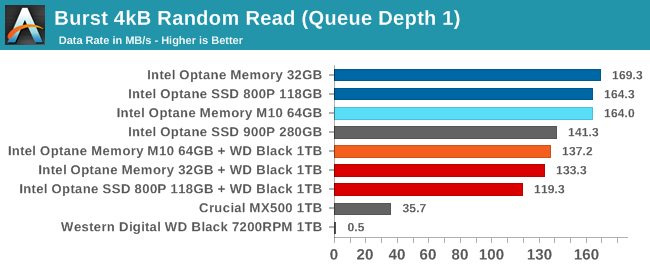
The M.2 Optane modules offer the fastest burst random read speeds when tested as standalone drives, but Intel's caching system imposes substantial overhead. Even with that overhead, the random read performance is far above any solution that doesn't involve 3D XPoint memory. As in past reviews, we find that the Optane Memory/Optane SSD 800P has a slight advantage here over the top of the line Optane SSD 900P.
Our sustained random read performance is similar to the random read test from our 2015 test suite: queue depths from 1 to 32 are tested, and the average performance and power efficiency across QD1, QD2 and QD4 are reported as the primary scores. Each queue depth is tested for one minute or 32GB of data transferred, whichever is shorter. After each queue depth is tested, the drive is given up to one minute to cool off so that the higher queue depths are unlikely to be affected by accumulated heat build-up. The individual read operations are again 4kB, and cover a 64GB span of the drive.
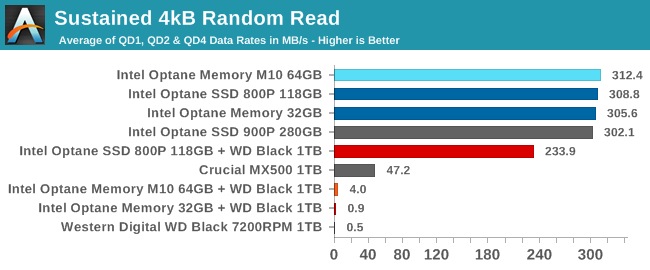
The sustained random read test covers a larger span of the drive, and the 32GB and 64GB modules are not large enough to cache the entire dataset plus the necessary cache management metadata, leaving them with performance close to that of the the hard drive. The 118GB cache is sufficient to contain the full data set for this test, and its performance is below that of the Optane drives tested as standalone drives, but still out of reach of flash-based storage.
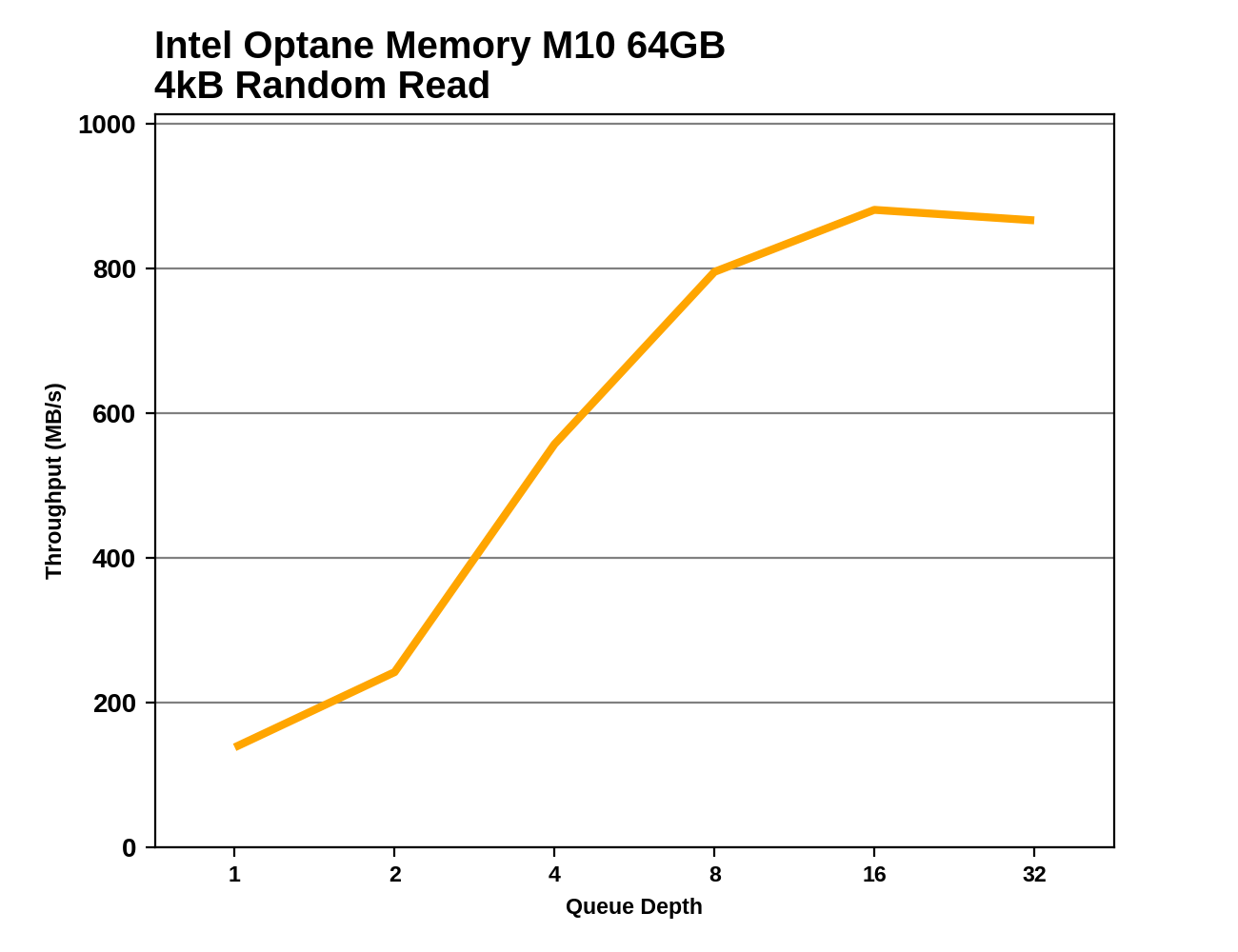 |
|||||||||
The random read performance scaling of the Optane Memory and 800P drives is rather uneven at higher queue depths, but they do still reach very high throughput. The 118GB cache configuration doesn't scale to higher queue depths as well as the standalone SSD configuration, and the 900P hits a wall at a far lower performance level than it should based on our Linux benchmarking.
Random Write Performance
Our test of random write burst performance is structured similarly to the random read burst test, but each burst is only 4MB and the total test length is 128MB. The 4kB random write operations are distributed over a 16GB span of the drive, and the operations are issued one at a time with no queuing.
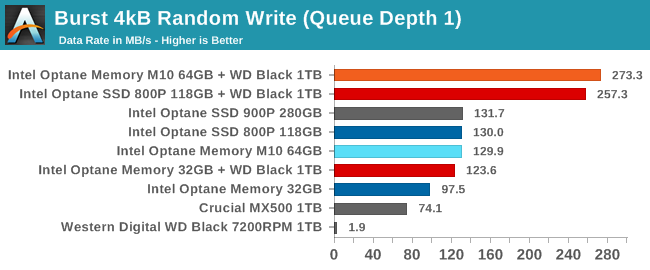
On the burst random write test, the larger two caching configurations perform far above what any standalone drive delivers under Windows. The 32GB Optane Memory module also scores better when used as a cache than as a standalone SSD. It is possible that Intel's caching software is also using a RAM cache and is lying to the benchmark software about whether the writes have actually made it onto non-volatile storage. However, the performance here is not actually beyond what NVMe SSDs deliver when we test them under Linux, so it's somewhat possible that there are simply some much-needed fast paths in Intel's drivers.
As with the sustained random read test, our sustained 4kB random write test runs for up to one minute or 32GB per queue depth, covering a 64GB span of the drive and giving the drive up to 1 minute of idle time between queue depths to allow for write caches to be flushed and for the drive to cool down.
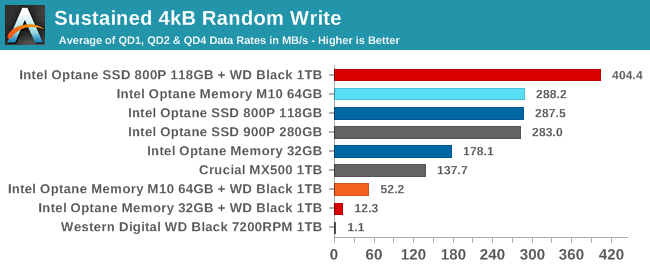
The sustained random write test covers more data than can be cached on the 64GB Optane Memory M10, so it and the 32GB cache module fall far behind mainstream SATA SSDs. The standalone Optane SSDs continue to offer great performance, and the 118GB Optane SSD 800P as a cache device tops the chart.
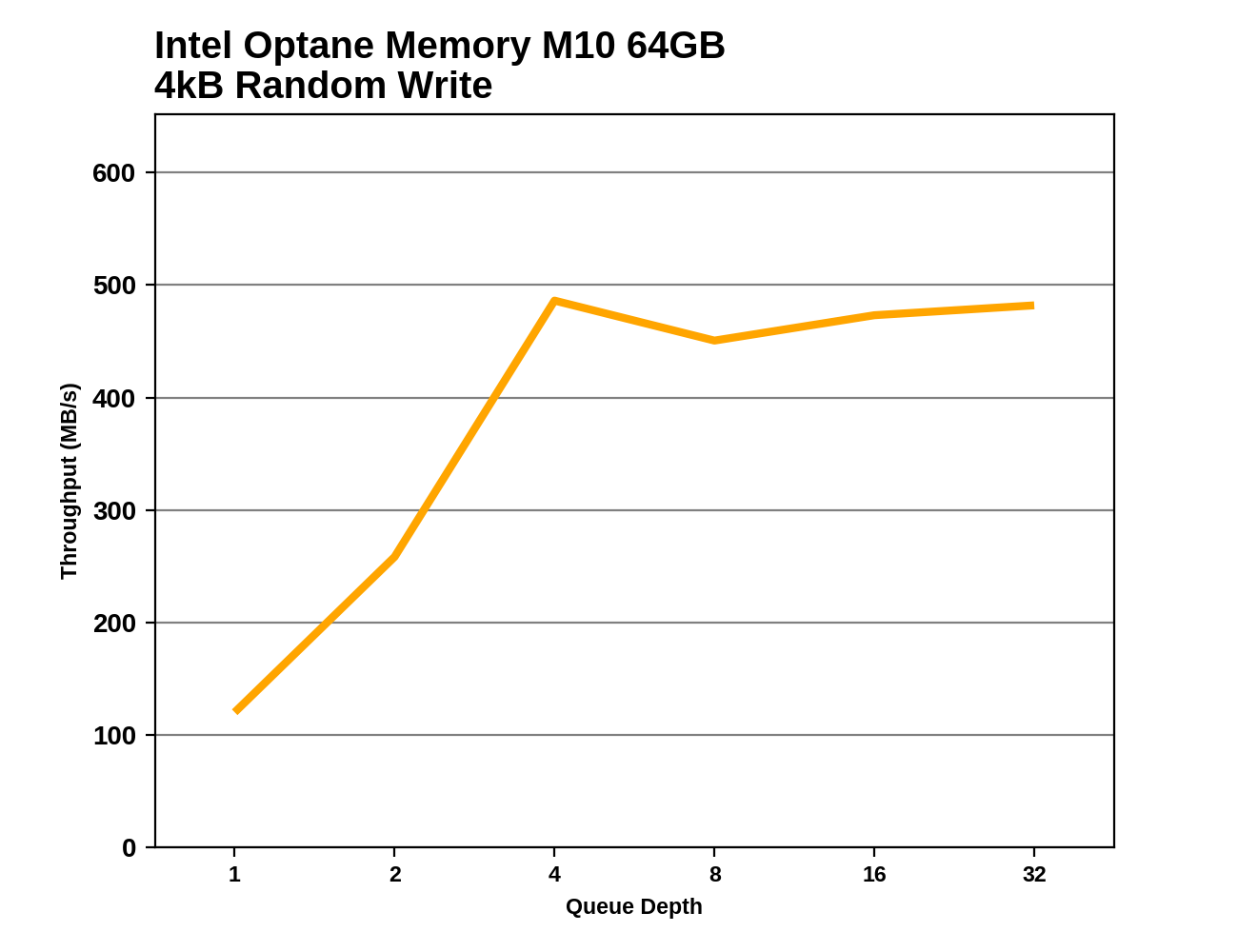 |
|||||||||
For the one configuration with a cache large enough to handle this test, performance scales up much sooner than in the standalone SSD configuration: QD2 gives almost the full random write speed. When the cache is too small, increasing queue depth just makes performance worse.










96 Comments
View All Comments
Samus - Wednesday, May 16, 2018 - link
For $160-$170 (<$150 on sale, basically the price of 64GB of Optane) you can get a the WD Black 512GB M2 NVME PCIe SSD that does 2000MB+/sec rear for all 512GB.Why the hell is Optane so expensive. 5-7x the price of traditional NAND?
Arnulf - Wednesday, May 16, 2018 - link
Because it is crap which nobody would buy if it was priced close to SSDs of similar performance and capacity:"It costs 5-7 times more than SSDs, must be something magical about it, let's buy one honey!"
Much like $1000 mobile phones, bait for the stupid.
CheapSushi - Wednesday, May 16, 2018 - link
Because it uses phase change instead of NAND and it's new tech. They're trying to recoup R&D cost.FunBunny2 - Wednesday, May 16, 2018 - link
"hey're trying to recoup R&D cost. "PCM is decades old tech. look it up. throwing good money after bad, just like pharma.
deil - Wednesday, May 16, 2018 - link
I have 8 TB drive AND I would enjoy some speedup as current usual run takes ~~5h full run. With that 32 GB joke drive even if it would not double the speed, Speedup of 20% time is a lot in my case. AND I don't get to redesign anything to use another drive or have to build 8 TB ssd raid.Spunjji - Wednesday, May 16, 2018 - link
On what basis do you think you'll achieve any speed-up, though?tipoo - Wednesday, May 16, 2018 - link
Yeah, I can't see why 5x the NAND for the cost wouldn't almost always be preferable for budget systems.I can only see this making sense for datacenter use.
0ldman79 - Thursday, May 17, 2018 - link
Primocache does the same thing.I've got an 80gig in my desktop, a 60 in an Asus laptop that has two 2.5 bays and a 16gig M.2 in my Inspiron 7559.
I don't use RAM as a buffer, just the SSD. Works great, unless you have an unstable system. Any time you lose power or don't shut down cleanly the cache resets. With the cache, however, my main box boots in about 20-30 seconds, all apps loaded, where as just running the mechanical drive a reboot is nearly a 4 minute affair.
lefty2 - Tuesday, May 15, 2018 - link
Ironically, these drives work better with AMD motherboards than Intel:https://fudzilla.com/news/pc-hardware/46145-amd-st...
CajunArson - Tuesday, May 15, 2018 - link
Where does Idiot-Zilla prove that Optane works "better" with AMD motherboards than Intel?But for a site that starts with "Fud" I will give them credit for dispelling the completely wrong "FUD" that is actually spread by AMD fanboys that Optane is a proprietary technology that only works with Intel products. Never has been proprietary.